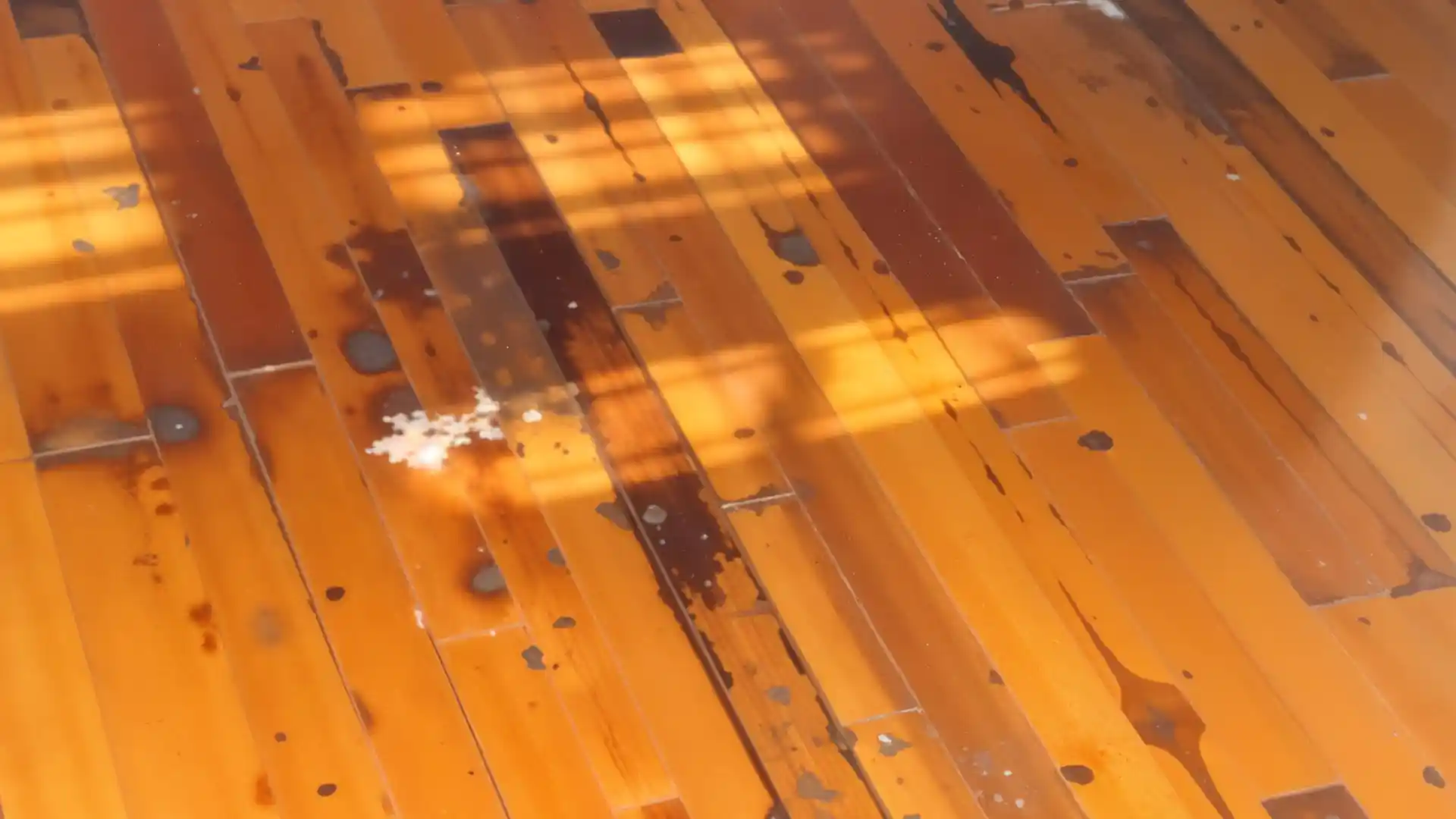How to Remove Pet Urine Stains from Hardwood Floors
If you’re a pet owner, accidents happen — even with the most well-trained furry friends. Unfortunately, hardwood floors and pet urine don’t mix well. The acidity and moisture in urine can seep into the wood, leaving behind stains, discoloration, and unpleasant odors that are tough to eliminate. But don’t panic — there are effective ways to clean and restore your floors to their original shine.
In this guide, we’ll walk you through the best methods to remove pet urine stains from hardwood floors and explain when it’s time to call in professionals like ServiceMaster Albino, the leading disaster restoration and cleaning company trusted by homeowners for decades.
Understanding Why Pet Urine Damages Hardwood Floors
Before you start cleaning, it’s important to understand what you’re dealing with. Pet urine contains ammonia and uric acid — both highly corrosive substances. When urine sits on hardwood, it can:
- Penetrate the wood grain, causing dark stains that are hard to remove.
- React with the wood’s finish, leading to dullness or discoloration.
- Create lingering odors, especially in humid conditions, as uric acid crystals reactivate with moisture.
If not cleaned promptly, pet urine can even warp wood boards or cause mold growth beneath the surface. That’s why immediate action is key.
Step 1: Blot the Area Immediately
If the accident is fresh, speed is everything.
- Use paper towels or a dry cloth to soak up as much urine as possible.
- Avoid rubbing, as this spreads the liquid and forces it deeper into the wood.
- Press firmly and replace towels as they become saturated until no more moisture lifts off.
If you caught it early, you might prevent permanent staining.
Step 2: Neutralize the Odor
Once the area is dry, you’ll need to neutralize the smell. Regular household cleaners or vinegar won’t always do the trick because uric acid crystals can persist even after cleaning.
Here’s what works best:
- Enzymatic Cleaners:
These are designed specifically for pet urine. Enzymes break down the organic compounds in urine, eliminating odor at its source. Apply generously, let it sit for 10–15 minutes, and then wipe clean. - Hydrogen Peroxide Solution:
Mix 3% hydrogen peroxide with a few drops of dish soap and apply it with a soft cloth. Let it sit for a few minutes before wiping away. Peroxide can help lighten dark spots caused by urine oxidation.
⚠️ Tip: Always test cleaning solutions on an inconspicuous area first to ensure they don’t affect the floor’s finish.
Step 3: Treat Set-In Stains
If the urine has already dried or left a visible stain, deeper treatment is needed.
Option 1: Baking Soda Paste
- Mix baking soda with a small amount of water to create a thick paste.
- Apply to the stained area and let it sit overnight.
- Wipe clean with a damp cloth the next day.
This helps lift mild surface stains and neutralize odors.
Option 2: Hydrogen Peroxide Soak
For darker stains, saturate a soft cloth with hydrogen peroxide and lay it over the affected area. Cover with plastic wrap and let it sit for several hours or overnight. This allows the peroxide to penetrate the wood fibers.
Remove and wipe the area clean. You may notice the stain lightening significantly after a few applications.
Option 3: Sanding and Refinishing
If the stain has penetrated deep into the wood grain, surface cleaning may not be enough. In such cases, you’ll need to sand the area down and refinish it.
While minor touch-ups can be DIY-friendly, extensive staining should be handled by professionals to prevent uneven results or damage to your flooring.
Step 4: Seal and Protect the Floor
After cleaning, it’s crucial to protect your hardwood floors from future accidents.
- Apply a wood-safe sealant or finish to create a moisture barrier.
- Use rugs or pet pads in high-risk areas, especially around feeding and sleeping zones.
- Maintain humidity levels in your home — excessive dryness can cause cracks where urine might seep in again.
When to Call the Professionals
Sometimes, despite your best efforts, the stain and odor just won’t go away. This usually means urine has seeped below the surface into the subflooring.
That’s where ServiceMaster Albino comes in.
Why Choose ServiceMaster Albino?
- Expertise You Can Trust:
With years of experience in disaster restoration and cleaning, ServiceMaster Albino specializes in hardwood floor restoration, odor removal, and deep cleaning services. - Advanced Cleaning Technology:
Their technicians use industrial-grade equipment and specialized cleaning agents that go far beyond household solutions — penetrating deep into wood layers to remove contaminants and odors completely. - Comprehensive Services:
Whether it’s water damage, fire restoration, mold remediation, or pet-related cleaning issues, ServiceMaster Albino provides end-to-end solutions that restore your home to its best condition. - Customer Satisfaction Guarantee:
The company’s commitment to quality and professionalism has made it a trusted name among homeowners who demand the very best.
If your hardwood floors have dark stains, buckling, or persistent odor after cleaning attempts, it’s time to contact ServiceMaster Albino. Their trained technicians can assess the damage and recommend the most effective restoration plan — saving you time, effort, and the cost of replacing your floors.
Preventing Future Pet Accidents
Lastly, prevention is better than cure. Here are a few tips to minimize future mishaps:
- Train and supervise pets, especially in new environments.
- Use enzyme-based pet repellents in problem areas.
- Clean accidents immediately — even small delays can cause long-term damage.
- Regularly inspect and maintain your floors, ensuring that finish coatings remain intact.
Final Thoughts
Pet urine on hardwood floors can feel like a nightmare, but it doesn’t have to mean permanent damage. With prompt action, the right cleaning solutions, and professional help when needed, your floors can look and smell as good as new.
When home remedies fall short, ServiceMaster Albino stands ready to help — offering expert hardwood restoration and deep-cleaning services that homeowners can rely on. Don’t let stains and odors linger — call the professionals and bring your floors back to life.
FAQ
1. Can pet urine permanently damage hardwood floors?
Yes. If not cleaned promptly, pet urine can seep into the wood grain and cause permanent staining, warping, and odor. The acidity in urine breaks down the floor’s protective finish and discolors the wood beneath. Deep stains may require sanding, refinishing, or professional restoration.
2. What’s the best home remedy for removing fresh pet urine from hardwood floors?
Blot the urine immediately with paper towels or a dry cloth, then clean the area with an enzyme-based cleaner or a hydrogen peroxide and mild soap solution. These break down organic compounds and neutralize odors effectively without damaging the wood.
3. Can I use vinegar to clean pet urine on hardwood floors?
While vinegar can help neutralize odors, it’s not always recommended for hardwood floors. Its acidity may dull the floor’s finish or cause discoloration over time. Enzymatic cleaners or hydrogen peroxide are safer and more effective alternatives.
4. How do I remove old or dark urine stains from hardwood?
For set-in stains, apply hydrogen peroxide using a soft cloth and cover with plastic wrap overnight. This helps lift deep discoloration. If the stain remains, sanding and refinishing may be necessary — something best handled by professionals like ServiceMaster Albino.
5. How do I get rid of lingering pet urine odor?
Lingering odors usually mean urine has penetrated below the surface. Enzyme cleaners can help, but if the smell persists, professional deep cleaning or subfloor treatment may be needed. ServiceMaster Albino offers specialized deodorization and wood restoration solutions for this problem.
6. Will hydrogen peroxide damage my hardwood floors?
Hydrogen peroxide (3%) is generally safe for hardwood when used properly. Always test it in an inconspicuous area first, as it can slightly lighten some finishes. Avoid excessive use and rinse the area with water after cleaning.
7. Can professional cleaning completely remove urine stains and odor?
Yes — professional cleaning services like ServiceMaster Albino use industrial-grade equipment and specialized solutions to extract contaminants from deep within the wood. This process can eliminate stains and odors that household cleaners can’t reach.
8. How can I prevent my pet from urinating on hardwood floors again?
Prevention involves training and deterrence. Use pet repellent sprays, place pads or rugs in high-risk areas, and address behavioral issues promptly. Also, ensure your pet’s medical and emotional needs are met, as anxiety or illness can cause accidents.
9. Should I sand and refinish the floor myself or hire a professional?
Minor stains can be DIY projects, but deeper or widespread damage requires professional expertise. Improper sanding or refinishing can leave uneven patches or worsen the problem. ServiceMaster Albino provides expert hardwood restoration for such cases.
10. How do I protect my hardwood floors from future pet accidents?
- Apply a protective sealant to create a moisture barrier.
- Use rugs or mats in pet zones.
- Clean spills immediately.
Schedule periodic maintenance with professionals like ServiceMaster Albino to keep your floors in top condition.

